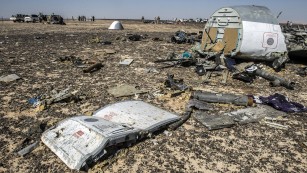British
Foreign Minister Philip Hammond said his government believes there is a
"significant possibility" that an explosive device caused the crash.
And a Middle East source briefed on intelligence matters also said it
appears likely someone placed a bomb aboard the aircraft. Metrojet Flight 9268 crashed Saturday in Egypt's Sinai Peninsula after breaking apart in midair, killing all 224 people on board. It was en route to St. Petersburg from the Red Sea resort of Sharm el-Sheikh.
The
latest U.S. intelligence suggests that the crash was most likely caused
by a bomb planted on the plane by ISIS or an affiliate, according to
multiple U.S. officials who spoke with CNN. The
officials stressed that no formal conclusion has been reached by the
U.S. intelligence community and that U.S. officials haven't seen
forensic evidence from the crash investigation. Intelligence also suggests someone at the Sharm el-Sheikh airport helped get a bomb onto the plane, one U.S. official said. "This
airport has lax security. It is known for that," the official said.
"But there is intelligence suggesting an assist from someone at the
airport. "
Egyptian authorities, who
are leading the investigation into the crash, haven't publicly responded
to reports on U.S. intelligence. Since the crash, they've downplayed
the possibility that terrorism could be involved.
Typically,
ISIS is quick to trumpet how and who carried out any attacks for
purposes of praise and propaganda. To some, the fact that ISIS hasn't
provided details in this case raises doubt about the group's repeated
claims of responsibility. Officials in Egypt and Russia have said there's no evidence to support ISIS' claims. "That
was a very baffling way to claim credit for what would be the most
significant terrorist attack since 9/11," CNN terrorism analyst Paul
Cruickshank said. "But there may have been a method behind this and a
reason behind this, and that may have been to protect an insider at
Sharm el-Sheikh airport."


No comments:
Post a Comment